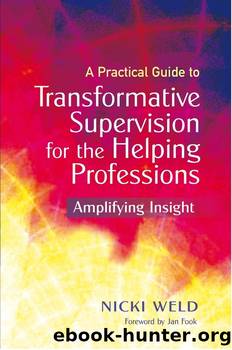A Practical Guide to Transformative Supervision for the Helping Professions by Nicki Weld

Author:Nicki Weld [Weld, Nicki]
Language: eng
Format: epub
Tags: Social Science, Social Work, Psychology, Psychotherapy, General, Human Services
ISBN: 9780857005410
Google: kuI2lPyQuMIC
Publisher: Jessica Kingsley Publishers
Published: 2011-09-15T04:13:43+00:00
Further application to identify and strengthen intuitive reasoning
The purpose of greater examination of our intuitive reasoning is to develop a stronger base of personal practice theory in our work. By looking more closely at this side of our reasoning we can articulate and have more clarity about the sources of knowledge informing it. So as supervisors how do we do support this? First we must pay attention to the emotions that are in play and explore these using the type of questions suggested in the previous chapter. This will help reach the intuitive thinking behind the emotional response. Here are five suggestions that can support us to do this:
1. âWhat is/was your intuition telling you about this?â
This is a first step in asking someone to focus more deeply and listen to themselves. It is about naming their intuitive response and then further exploring it to build analytic reasoning to support or question it.
2. âWhat would a wise woman or man say to you about how to respond to or think about this issue?â
This is a question that was shared with me from a friend who attends the School of Philosophy in Wellington New Zealand and what I find it does is cause a pause and a consideration of what a sensible, wise and rational approach would look like. What I particularly like about this question is that it connects a person to their internal wise woman or man â the place of wisdom within them, reinforcing that we often have the answer and do not need another person to tell us. This can be very powerful for people and hence contributes to transformative change.
3. Unpacking an event. When a supervisee talks about an event, issue, or situation, take time to guide them through looking for the messages, the patterns, personal constructs, previous associations and events that link to it.
This is about slowing down and looking deeply. A good analogy for this is when you go to a river and sit down beside it and look into the water. First you will observe the speed of the water, perhaps some rocks, and perhaps the depth. As you look more closely you might start to observe the light and how it falls on the water and influences the colour of it, how the water moves around a stone or rock so it isnât blocked, you may even see a fish! When you look up from focusing on the river you usually feel more peaceful. This is another way of engaging in transformative work â moving from one current of feeling or response to another that perhaps is gentler and feels more in flow with who we are. It is about observing and noticing to help us grow and develop.
4. âWhat are the thoughts, feelings, beliefs, reactions that you didnât name/couldnât name/arenât naming? What is their source (or the core belief) behind them?â
This is about giving our intuition knowledge further voice. It asks that a person go beyond the often required rhetoric of daily human interaction and say what they really think even if it might be a bit shocking.
Download
This site does not store any files on its server. We only index and link to content provided by other sites. Please contact the content providers to delete copyright contents if any and email us, we'll remove relevant links or contents immediately.
The Secret History by Donna Tartt(19092)
The Social Justice Warrior Handbook by Lisa De Pasquale(12190)
Thirteen Reasons Why by Jay Asher(8912)
This Is How You Lose Her by Junot Diaz(6888)
Weapons of Math Destruction by Cathy O'Neil(6281)
Zero to One by Peter Thiel(5802)
Beartown by Fredrik Backman(5756)
The Myth of the Strong Leader by Archie Brown(5509)
The Fire Next Time by James Baldwin(5447)
How Democracies Die by Steven Levitsky & Daniel Ziblatt(5219)
Promise Me, Dad by Joe Biden(5154)
Stone's Rules by Roger Stone(5088)
A Higher Loyalty: Truth, Lies, and Leadership by James Comey(4964)
100 Deadly Skills by Clint Emerson(4926)
Rise and Kill First by Ronen Bergman(4790)
Secrecy World by Jake Bernstein(4753)
The David Icke Guide to the Global Conspiracy (and how to end it) by David Icke(4720)
The Farm by Tom Rob Smith(4514)
The Doomsday Machine by Daniel Ellsberg(4490)
